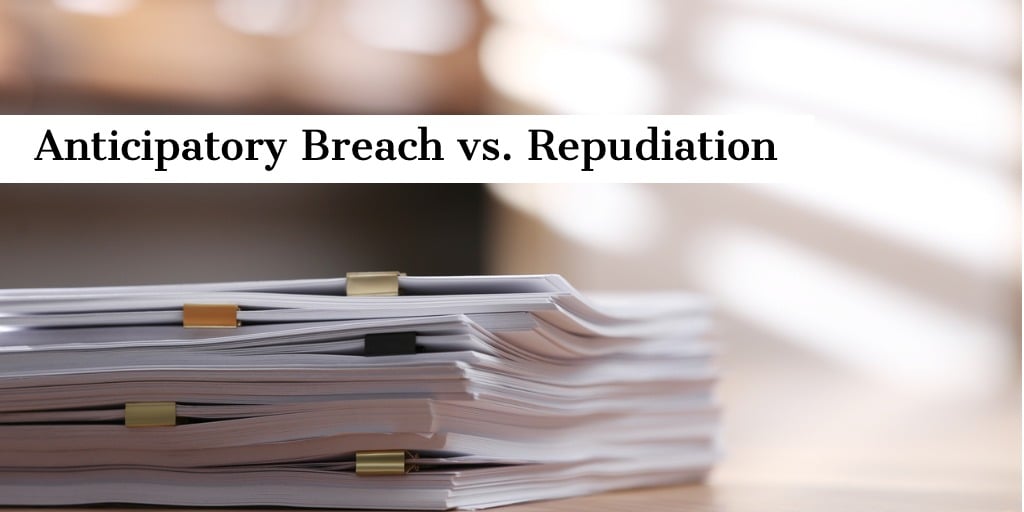Anticipatory repudiation is a pivotal concept in contract law. It occurs when one party signals they won’t fulfill their contractual duties, allowing the other party to seek remedies before the performance is due.
Understanding anticipatory repudiation is crucial for business owners and managers, as it can affect future performance and operations of a business. This knowledge is especially vital in California, where contract law recognizes anticipatory repudiation. By understanding the legal remedies available, businesses can prevent potential disruptions, safeguard business relationships, and protect their interests.
This article will explore anticipatory repudiation in detail. It will offer practical insights and strategies for businesses. Understanding this concept is essential for maintaining contractual rights and obligations.
What is Anticipatory Repudiation?
Anticipatory repudiation is a legal term in contract law. It refers to a situation where one party declares they cannot or will not perform their contractual obligations. This declaration occurs before the performance is due. Anticipatory repudiation can be expressed through definite words or actions. These statements or behaviors must clearly indicate an intention not to perform. Ambiguous signals do not suffice to establish repudiation.
When an anticipatory repudiation occurs, the non-breaching party has several options. They may choose to treat the contract as breached and seek legal remedies immediately. Alternatively, they can wait until performance is due to see if the breach resolves.
Anticipatory Repudiation Common Law and California Contract Law
Anticipatory repudiation has its roots in common law principles, and is widely recognized as a concept within contract enforcement. This doctrine provides legal recourse when a party announces non-performance before their duties are due.
California contract law echoes these common law principles. The state upholds anticipatory repudiation as a valid basis for claiming breach. This allows affected parties to pursue appropriate legal remedies without delay. To navigate anticipatory repudiation under California law, certain elements must be met. These include clear evidence of intent and unfulfilled performance obligations. Legal advisors often prove invaluable in assessing these conditions accurately.
Here are key points on anticipatory repudiation under these laws:
- Recognition: Valid for establishing breach claims.
- Legal Framework: Embedded in both common and California law.
- Conditions: Intent and failure of performance must be demonstrable.
For business leaders, understanding these nuances ensures more robust contract management. Being informed helps in making strategic decisions, minimizing risk, and maintaining operational stability. Legal counsel offers guidance tailored to the specific circumstances of each case, adapting general principles to particular situations.
Anticipatory Repudiation Elements
Understanding the elements of anticipatory repudiation is crucial for business owners. This knowledge helps assess whether a contract breach has occurred. Identifying these anticipatory actions ensures you take effective legal action.
Here are the core elements involved:
- Unequivocal Intent: There must be an unequivocal indication of non-performance. This can be demonstrated through words or actions showing an intent to default. The communication must be clear, leaving no room for misinterpretation.
- Material Obligation: The repudiation must involve a significant contractual obligation. Minor breaches usually do not qualify as anticipatory repudiation. The obligation should be essential to the contract’s objectives.
- Non-Breaching Party’s Readiness: The non-breaching party must be prepared to fulfill their contractual obligations. Readiness to perform obligations is key to establishing a valid claim.
Anticipatory Breach vs Repudiation: Key Differences
Though they are often used interchangeably, anticipatory breach and repudiation are distinct concepts in contract law. Understanding these differences can aid businesses in crafting more precise legal strategies and responses.
An anticipatory breach refers to a party’s explicit refusal or inability to fulfill future performance. In contrast, repudiation involves actions or statements signaling an intention not to perform. The key distinction lies in the manner and certainty of non-performance.
In a breach, the non-performance is direct and certain. However, repudiation involves indirect indicators, leaving room for possible performance under different circumstances. Recognizing these differences is vital for businesses responding to potential contract issues.
Key differences include:
- Certainty vs. Indirectness: Breach is certain; repudiation implies non-performance.
- Statement vs. Action: Breach is expressed; repudiation is implied.
- Response Strategy: Requires differing legal remedies.
By distinguishing between breach and repudiation, business leaders can better protect their operations and contractual rights.
For more information, see our article on breach of contract law in California.
How Anticipatory Repudiation Occurs: Words, Actions, and Examples
Anticipatory repudiation arises when a party signals their inability or unwillingness to perform contractual obligations. This can be conveyed through definitive words or evident actions.
Words Leading to Repudiation
Certain statements can clearly constitute repudiation, including:
- Explicit declaration of non-performance.
- Expressing intent to violate key contract terms.
Such statements provide the non-breaching party the right to pursue legal remedies immediately.
Actions Signifying Repudiation
Actions can also signal anticipatory repudiation, such as:
- Selling goods designated for a contractual agreement to another buyer.
- Ceasing all contract-related communications abruptly.
These actions show an intent to not fulfill obligations, warranting preemptive legal measures.
Anticipatory Repudiation Example
Consider a supplier who informs a small business they will not meet an agreed delivery schedule. Here, the supplier’s message constitutes clear anticipatory repudiation, permitting the business to seek contract damages or terminate the agreement.
Understanding the nuances of anticipatory repudiation allows businesses to prepare and act decisively when faced with potential contract breaches. This preparedness can help mitigate risks and maintain business continuity.
Legal Implications and Consequences for Businesses
Anticipatory repudiation bears serious legal implications for companies. It impacts contractual rights and obligations, influencing operational stability and financial health. Understanding these consequences can aid in effective risk management.
When a party repudiates, the non-breaching party gains several options. They can treat the repudiation as an immediate breach and seek remedies. Alternatively, they might await the performance date to see if the breaching party performs as promised.
Key consequences include the potential for immediate litigation. A business may seek damages to cover losses from the breach, or look for specific performance, compelling the breaching party to fulfill their contract duties.
Consequences of Anticipatory Repudiation:
- Triggering immediate legal remedies.
- Disrupting business operations and plans.
- Affecting company reputation and relationships with stakeholders.
Businesses need to remain vigilant and prepared for potential ramifications. Seeking legal advice from a contract attorney, such as those at Law Advocate Group, can help businesses navigate these situations, protect interests, and maintain business integrity in the face of contract breaches.
Legal Remedies for Anticipatory Repudiation
When anticipatory repudiation occurs, legal remedies become crucial. These remedies safeguard the non-breaching party’s interests and ensure fair outcomes. Legal guidance helps navigate these options effectively.
One primary remedy is suing for damages. The non-breaching party can recover losses resulting from the breach. Damages aim to place the injured party in the position they would have occupied had the contract been fulfilled.
Another remedy is specific performance. Here, the court orders the breaching party to fulfill their contractual obligations. This remedy is often used when monetary damages prove inadequate or the subject matter is unique.
Businesses may also seek rescission of the contract, canceling it altogether. This is often a strategic choice when the contract’s continuation seems untenable.
Legal Remedies Overview:
- Damages: Monetary compensation for incurred losses.
- Specific Performance: Court-enforced fulfillment of contract terms.
Situations Involving Additional Remedies:
- Rescission: Contract cancellation.
- Injunctions: Restricting specific actions related to the contract.
Effective legal remedies exist when facing contract repudiation, and businesses may benefit from partnering with a business lawyer with contract experience. Doing so can minimize the disruption to business operations and future performance.
For further information, read our article on legal remedies for breaches of contract.
Steps to Take When Facing Anticipatory Repudiation
When facing anticipatory repudiation, business should act swiftly to collect all relevant documentation, consult with legal counsel, and evaluate their available legal remedies.
Steps for Handling Anticipatory Repudiation:
- Organize Documents: Begin by gathering all relevant contract documents and communications related to the dispute.
- Consult Legal Counsel: Next, consult with legal counsel experienced in contract law. They will help assess the situation, outlining potential strategies for response.
- Evaluate Remedies: Consider the available legal remedies and decide the best course of action. This could involve pursuing damages, seeking specific performance, or rescinding the contract. Your decision should reflect your business goals and the practicalities of the situation.
- Document Actions: Document your actions meticulously to preserve evidence and maintain clarity. This documentation will be invaluable should legal proceedings become necessary.
Staying proactive and informed is essential. These steps ensure you effectively manage anticipatory repudiation and protect your business from further complications.
Preventing Anticipatory Repudiation
Preventing anticipatory repudiation begins with clear and comprehensive contracts. Ensure all terms are meticulously detailed to avoid misunderstandings. This clarity can significantly reduce the likelihood of future disputes.
Regularly review and update your contracts as business environments change. This practice keeps your agreements relevant and aligned with current laws. It also helps identify potential issues before they escalate into problems.
Educating your team about contract terms enhances accountability. Ensuring that everyone involved understands their responsibilities can prevent breaches. It also fosters communication and cooperation among parties.
Best Practices to Prevent Anticipatory Repudiation:
- Draft Clear Contracts: Define terms explicitly.
- Regular Reviews: Update contracts to reflect changes.
- Educate Team: Build awareness of contractual obligations.
Implementing these practices promotes stability and reduces the risk of anticipatory repudiation. They provide a robust foundation for successful business operations. A proactive approach safeguards not only legal interests but also business relationships.
Conclusion
Anticipatory repudiation poses a significant risk to contractual relationships. Understanding its nuances helps protect your interests. By staying informed, you can identify potential issues early. Engaging legal expertise ensures you’re prepared to act decisively if contract disputes arise.
For business owners and managers, proactive strategies are key. Establish clear contract terms and maintain open communication with all parties. Regularly consult legal counsel to safeguard your business against potential breaches. These steps will fortify your contractual obligations and promote smoother business operations.
Contact a Contract Attorney Today
To speak with a knowledgeable business contract attorney today, call Law Advocate Group at (310) 651-3065 or fill out the form below so that we may get in touch with you as soon as possible.







